牛津译林版(2019)必修 第二册Unit 2 Be sporty,be healthy Welcome to the unit & Reading 教学课件(共29张PPT)
文档属性
| 名称 | 牛津译林版(2019)必修 第二册Unit 2 Be sporty,be healthy Welcome to the unit & Reading 教学课件(共29张PPT) |
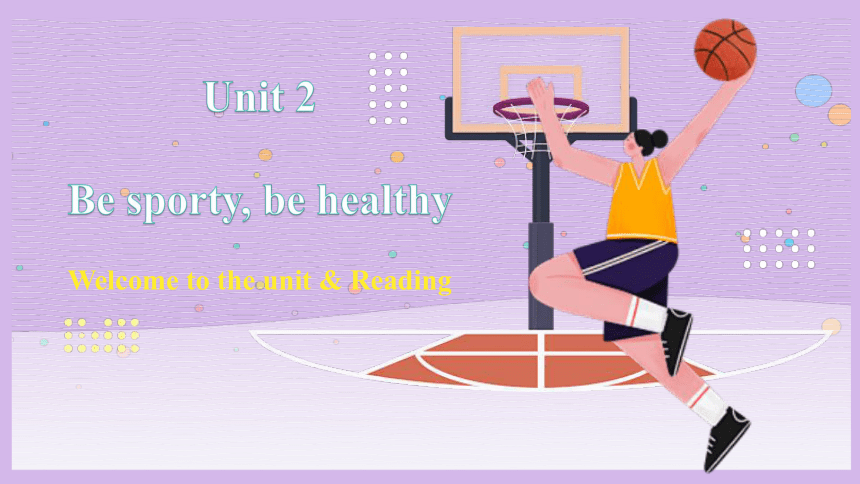
|
|
| 格式 | pptx | ||
| 文件大小 | 10.3MB | ||
| 资源类型 | 教案 | ||
| 版本资源 | 牛津译林版(2019) | ||
| 科目 | 英语 | ||
| 更新时间 | 2024-09-02 00:00:00 | ||
图片预览

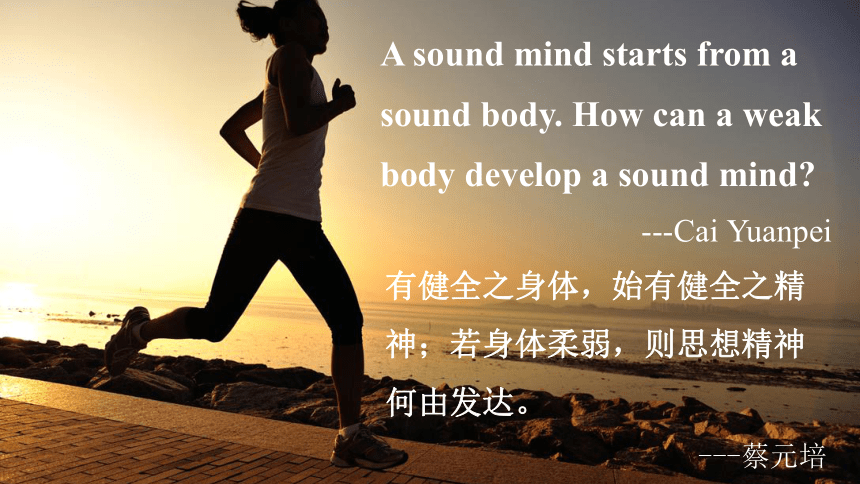
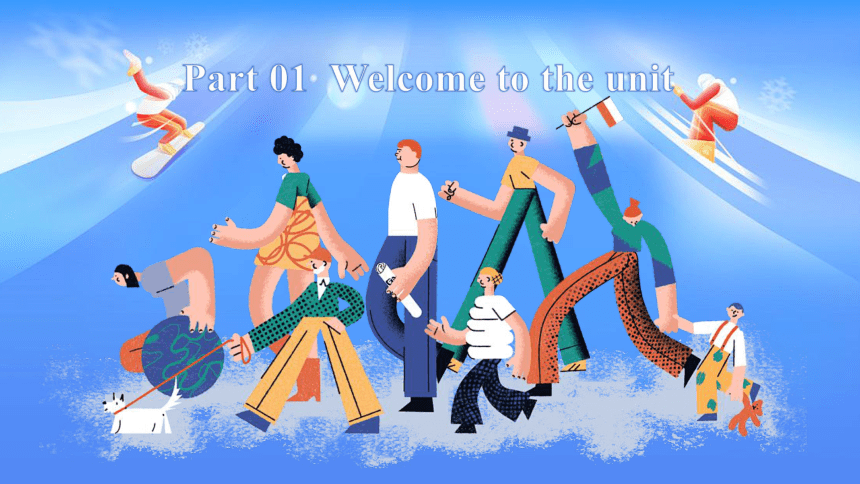

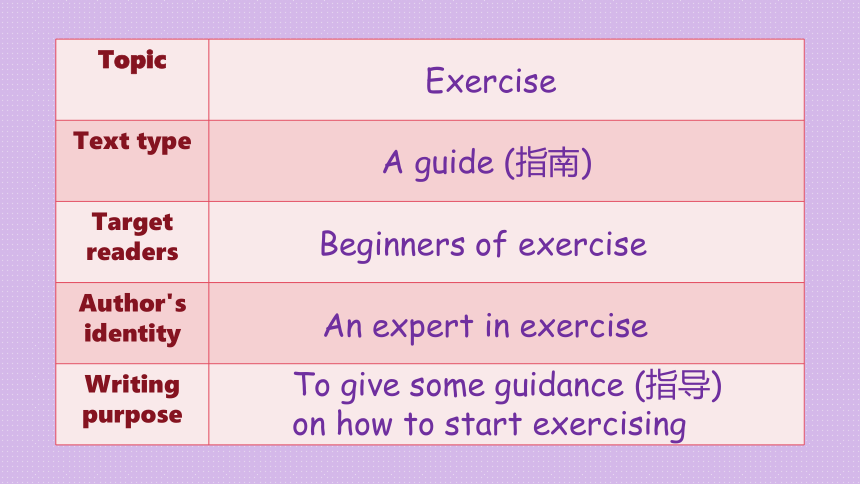
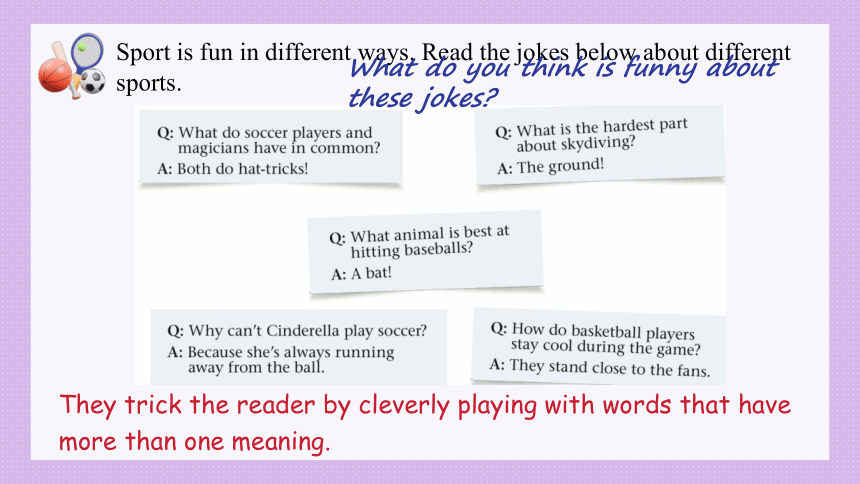
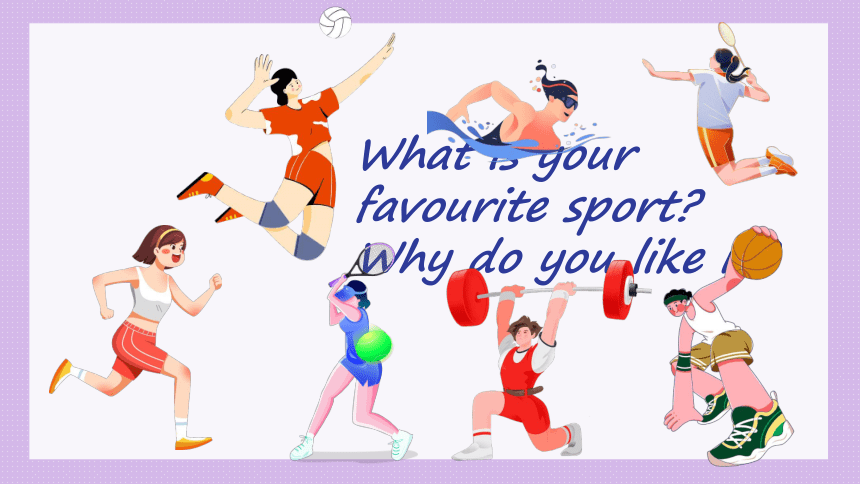
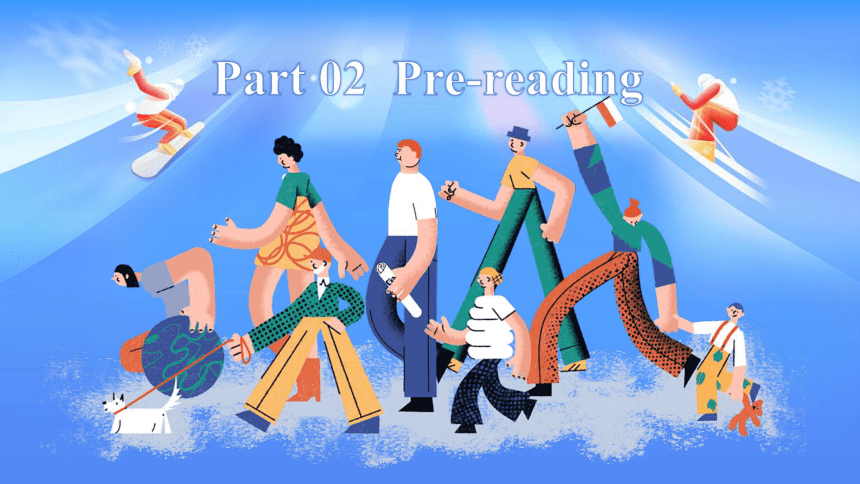
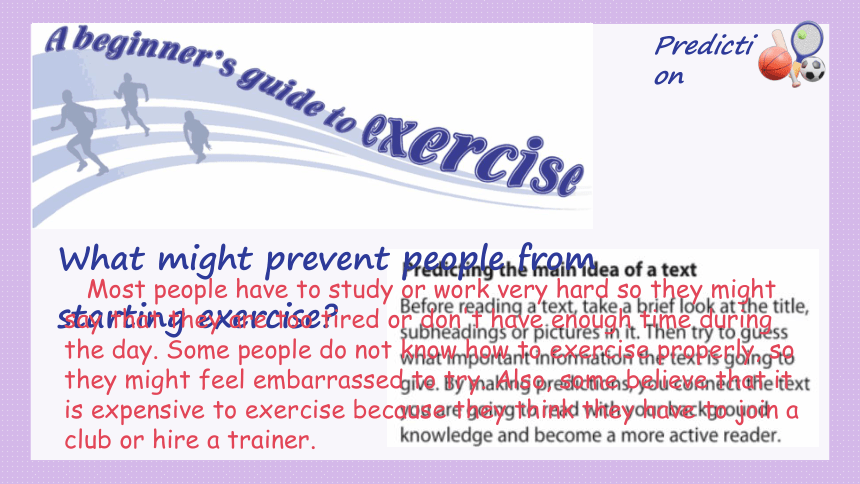
文档简介
(共29张PPT)
Unit 2
Be sporty, be healthy
Welcome to the unit & Reading
A sound mind starts from a sound body. How can a weak body develop a sound mind
---Cai Yuanpei
有健全之身体,始有健全之精神;若身体柔弱,则思想精神何由发达。
---蔡元培
Part 01 Welcome to the unit
What can you know about the article according to its title, subheadings (小标题) and pictures
Topic
Text type
Target readers
Author's identity
Writing purpose
Exercise
A guide (指南)
Beginners of exercise
An expert in exercise
To give some guidance (指导) on how to start exercising
Sport is fun in different ways. Read the jokes below about different sports.
What do you think is funny about these jokes
They trick the reader by cleverly playing with words that have more than one meaning.
What is your favourite sport
Why do you like it
Part 02 Pre-reading
Prediction
What might prevent people from starting exercise
Most people have to study or work very hard so they might say that they are too tired or don't have enough time during the day. Some people do not know how to exercise properly, so they might feel embarrassed to try. Also, some believe that it is expensive to exercise because they think they have to join a club or hire a trainer.
Prediction
What kind of information do you think this guide will give
I think it will talk about the benefits of exercise and how to start exercising. It may also offer some tips about how to make an exercise plan and what to wear during the exercise.
Part 03 While-reading
What benefits of exercising are mentioned in Para.2
1. increase the _________ of your heart and lungs.
2. have better _________ systems and are at _______ risk of disease.
3. be good for your ___________health
4. improve certain ______________________
efficiency
immune
lower
mental
brain functions
Para 3
Aerobic activities
Heart and lung efficiency
Strength training
Muscle strength and bone development
Flexibility
training
Musle stretch and body's range of movement
to keep up your _______
What to eat and drink (Para.4)
water
to make up for water lost to______
carbohydrates
to recover and repair your muscles
protein
sweat
energy
What should we do to avoid injury (Para.5)
1. wear ________ clothes and equipment
2. start ______ and slowly work your way to a longer and harder exercise routine
3. ___________ before exercising and ________ after it.
proper
small
warm up
stretch
A1
The guide can be divided into four parts. Read the guide and complete the chart below with the main idea of each part.
Mental benefits
What you expect to improve
When to eat
Wearing proper clothes and equipment
Warming up before exercise and stretching after exercise
A2
Read the guide again carefully and answer the following questions.
1. Why is regular exercise good for the heart and lungs
During exercise, your heart and lungs must work harder. This extra effort makes them grow stronger over the long term.
2. How does flexibility training help you
Flexibility training, including gymnastics and tai chi, helps stretch your muscles and improve your body's range of movement.
A2
Read the guide again carefully and answer the following questions.
3. Why do you need to eat foods rich in protein
To help your muscles recover and repair themselves after exercise.
4. How long should you wait after exercise to have your meal
You should wait at least 30 minutes after a typical routine, or as much as an hour after a hard workout.
Part 04 Post-reading
A3
In pairs, discuss the following questions.
1. What are the purposes of this guide What techniques does the guide use for these purposes Support your answer with examples from the guide.
2. Do you agree with the guide that exercise can help you get over negative feelings Back up your opinion with examples from your experience.
3. What other information do you think could be included in the guide
Part 05
Building your language
B1
The passage below deals with a common false idea about plete the passage with the correct forms of the words and phrases in the box below.
assume
tend to
jogging
to make up for
over the long term
B1
The passage below deals with a common false idea about plete the passage with the correct forms of the words and phrases in the box below.
average
prevent
Moreover
B2
“Exercise and "health" appear in the guide as part of different collocations. Read the examples below and add more collocations.
Part 06
Language Points
assume
assume sb./sth. to be +n./adj.认为某人/某物是……
assume that… 假设……;认为……
It is (generally) assumed that… 人们(普遍)认为……
assumption n. 假定,假设
make an assumption 假定
on the assumption that… 假定……
练习:It's safe to _______ there will always be a demand for new software.
assume
tend
tend to do sth. 常常会做某事,往往会做某事
tend to/towards… 趋向……,趋于……
tend (to) sb./sth. 照料/照管某人/某物
tendency n.趋向;倾向
have a tendency to do sth.有做某事的倾向
练习:People ________ to work hard at this stage of life.
tend
reduce
reduce… (from…) to…
把……(从……)减少到……(to 之后接减少后的量)
reduce…by...
……减少了……(by 之后接减少的程度或幅度)
reduce(减少)的近义词是decrease,drop;反义词是 increase,rise。
这些词的用法相似:后可接to(用于表示增减后的量)和by(用于表示增减的程度或幅度)。
练习:There is some noise in the data which needs to be ________.
reduce
SEE YOU
NEXT TIME
Unit 2
Be sporty, be healthy
Welcome to the unit & Reading
A sound mind starts from a sound body. How can a weak body develop a sound mind
---Cai Yuanpei
有健全之身体,始有健全之精神;若身体柔弱,则思想精神何由发达。
---蔡元培
Part 01 Welcome to the unit
What can you know about the article according to its title, subheadings (小标题) and pictures
Topic
Text type
Target readers
Author's identity
Writing purpose
Exercise
A guide (指南)
Beginners of exercise
An expert in exercise
To give some guidance (指导) on how to start exercising
Sport is fun in different ways. Read the jokes below about different sports.
What do you think is funny about these jokes
They trick the reader by cleverly playing with words that have more than one meaning.
What is your favourite sport
Why do you like it
Part 02 Pre-reading
Prediction
What might prevent people from starting exercise
Most people have to study or work very hard so they might say that they are too tired or don't have enough time during the day. Some people do not know how to exercise properly, so they might feel embarrassed to try. Also, some believe that it is expensive to exercise because they think they have to join a club or hire a trainer.
Prediction
What kind of information do you think this guide will give
I think it will talk about the benefits of exercise and how to start exercising. It may also offer some tips about how to make an exercise plan and what to wear during the exercise.
Part 03 While-reading
What benefits of exercising are mentioned in Para.2
1. increase the _________ of your heart and lungs.
2. have better _________ systems and are at _______ risk of disease.
3. be good for your ___________health
4. improve certain ______________________
efficiency
immune
lower
mental
brain functions
Para 3
Aerobic activities
Heart and lung efficiency
Strength training
Muscle strength and bone development
Flexibility
training
Musle stretch and body's range of movement
to keep up your _______
What to eat and drink (Para.4)
water
to make up for water lost to______
carbohydrates
to recover and repair your muscles
protein
sweat
energy
What should we do to avoid injury (Para.5)
1. wear ________ clothes and equipment
2. start ______ and slowly work your way to a longer and harder exercise routine
3. ___________ before exercising and ________ after it.
proper
small
warm up
stretch
A1
The guide can be divided into four parts. Read the guide and complete the chart below with the main idea of each part.
Mental benefits
What you expect to improve
When to eat
Wearing proper clothes and equipment
Warming up before exercise and stretching after exercise
A2
Read the guide again carefully and answer the following questions.
1. Why is regular exercise good for the heart and lungs
During exercise, your heart and lungs must work harder. This extra effort makes them grow stronger over the long term.
2. How does flexibility training help you
Flexibility training, including gymnastics and tai chi, helps stretch your muscles and improve your body's range of movement.
A2
Read the guide again carefully and answer the following questions.
3. Why do you need to eat foods rich in protein
To help your muscles recover and repair themselves after exercise.
4. How long should you wait after exercise to have your meal
You should wait at least 30 minutes after a typical routine, or as much as an hour after a hard workout.
Part 04 Post-reading
A3
In pairs, discuss the following questions.
1. What are the purposes of this guide What techniques does the guide use for these purposes Support your answer with examples from the guide.
2. Do you agree with the guide that exercise can help you get over negative feelings Back up your opinion with examples from your experience.
3. What other information do you think could be included in the guide
Part 05
Building your language
B1
The passage below deals with a common false idea about plete the passage with the correct forms of the words and phrases in the box below.
assume
tend to
jogging
to make up for
over the long term
B1
The passage below deals with a common false idea about plete the passage with the correct forms of the words and phrases in the box below.
average
prevent
Moreover
B2
“Exercise and "health" appear in the guide as part of different collocations. Read the examples below and add more collocations.
Part 06
Language Points
assume
assume sb./sth. to be +n./adj.认为某人/某物是……
assume that… 假设……;认为……
It is (generally) assumed that… 人们(普遍)认为……
assumption n. 假定,假设
make an assumption 假定
on the assumption that… 假定……
练习:It's safe to _______ there will always be a demand for new software.
assume
tend
tend to do sth. 常常会做某事,往往会做某事
tend to/towards… 趋向……,趋于……
tend (to) sb./sth. 照料/照管某人/某物
tendency n.趋向;倾向
have a tendency to do sth.有做某事的倾向
练习:People ________ to work hard at this stage of life.
tend
reduce
reduce… (from…) to…
把……(从……)减少到……(to 之后接减少后的量)
reduce…by...
……减少了……(by 之后接减少的程度或幅度)
reduce(减少)的近义词是decrease,drop;反义词是 increase,rise。
这些词的用法相似:后可接to(用于表示增减后的量)和by(用于表示增减的程度或幅度)。
练习:There is some noise in the data which needs to be ________.
reduce
SEE YOU
NEXT TIME
